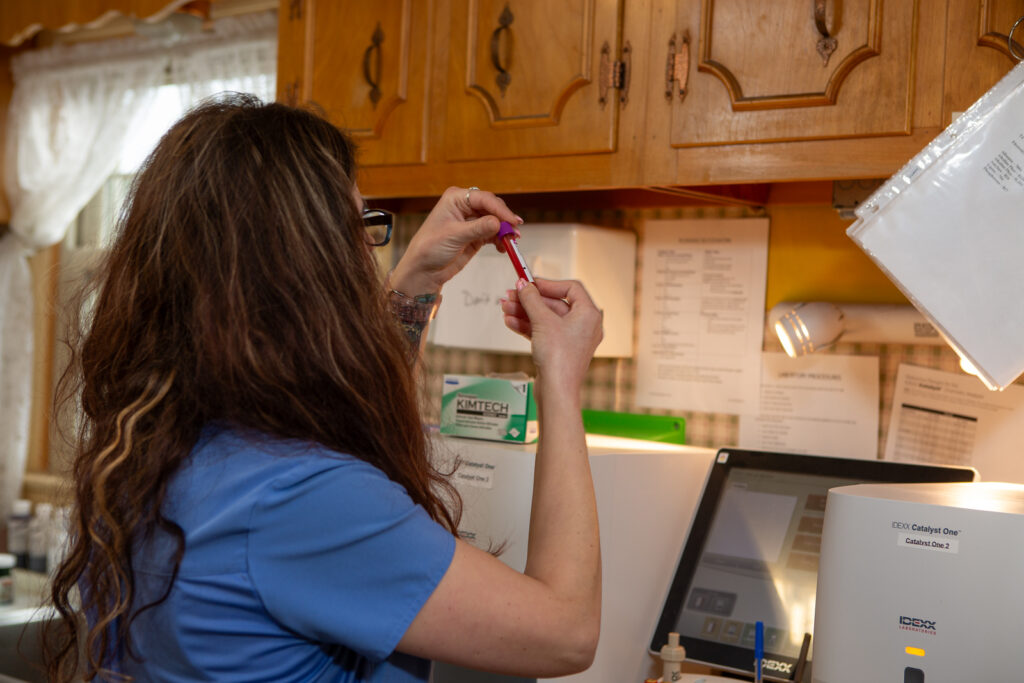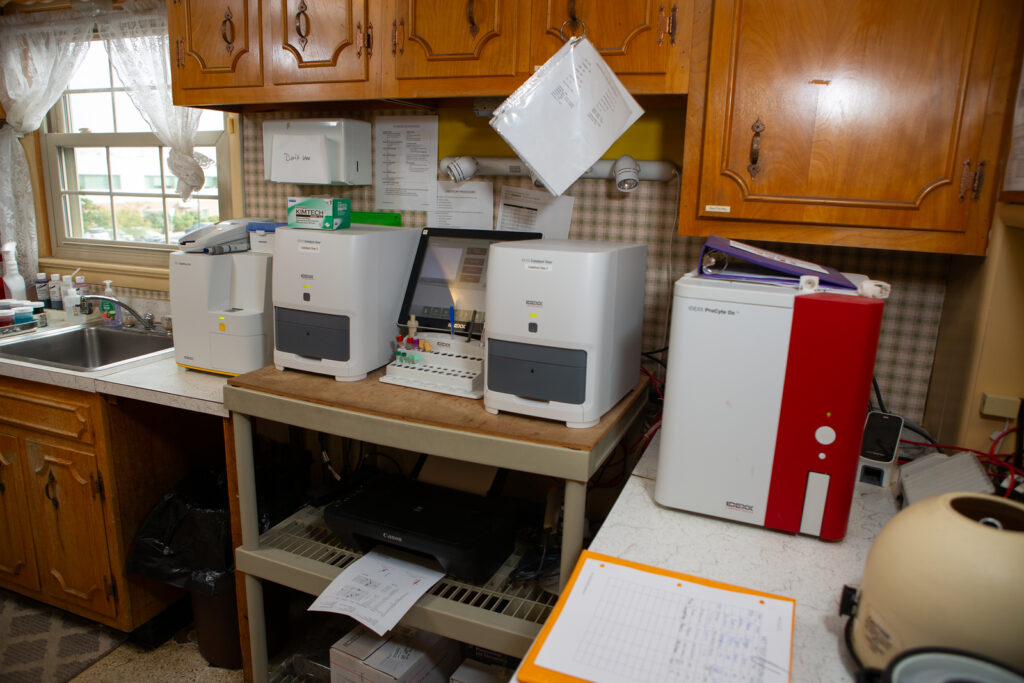In-House Lab
Bloodwork
Our state-of-the-art laboratory machines enable us to run most blood tests in-house decreasing the turn-around time associated with sending samples to an outside laboratory. This allows for a quicker diagnosis so that therapy may begin as soon as possible. In addition, we are able to run in-house pre-anesthetic bloodwork screens. Pre-anesthetic blood screening helps us to evaluate your pet’s ability to handle the risks accompanying sedation and anesthesia.
A general health profile is useful in evaluating body and organ function. It consists of a CBC (complete blood count), CHEM (blood chemistry), and T4 (thyroid level). Common diseases diagnosed on a CBC/CHEM/T4 include: kidney failure, liver disease, diabetes, and thyroid disease. For a more comprehensive look at a CBC/CHEM.
Fecal Examinations
Intestinal parasitic infections can result in extreme illness for both pets and human family members. Many intestinal parasitic diseases go undiagnosed because the parasites remain in the intestinal tract laying microscopic eggs that are expelled in the stool and invisible to the naked eye. By placing your pet’s stool sample under a microscope, our highly trained technicians can help us diagnose and treat for these parasites. Click here to learn about internal parasite prevention.
Cytology
Ear infections: An ear cytology helps us to identify the cause of many ear infections. The debris from an infected ear is examined under the microscope to determine the cause of the infection (bacterial vs. yeast vs. both). Once appropriately identified, the proper treatment regimen can be prescribed.
Skin tumors: Many lumps or tumors on your pet can be evaluated by needle aspirate. A small needle is used to aspirate (suck up) some cells from the lump/tumor which are then examined under the microscope for evidence of malignancy. Not all tumors are malignant. A needle aspirate can help us to determine the appropriate course of action.
Heartworm/Lyme disease testing
Heartworm (HW) disease): HW disease is caused by a parasite that is spread by mosquitoes into the bloodstream. The mature heartworms live in the heart and pulmonary system of the dog where, if left untreated, it can be fatal. There is only a 1% incidence of HW disease in the Frederick area. However, outside the Frederick area, especially near the bay, ocean, and all points south, the incidence jumps to 50-90% in unprotected dogs. We recommend placing an at-risk dog on a year-round preventative or testing for HW disease with a blood sample annually. An added advantage to placing your dog on monthly preventative is that it also controls intestinal parasite. It is far safer and easier to prevent HW disease in dogs than it is to cure the disease.
Lyme disease is contracted through the bite of an infected deer tick. Dogs most at risk are ones that live in an woodsy areas or areas with tall grass/brush, or are taken hiking on trails or taken camping. The disease targets the joints most commonly but in some cases can target the kidneys and result in kidney failure. Lyme disease is very prevalent in the Frederick area.
Felv/FIV testing
The Feline Leukemia Virus (FELV) and Feline Immunodeficiency Virus (FIV) cause diseases that affect a cat’s immune system which can lead to debilitating illness and even death. FELV is highly contagious and can affect all the organ systems. Adult cats typically contract FELV by coming into close contact with infected cats. Kittens can be infected by their mother before birth. FIV, on the other hand is believed to be spread through bite wounds from other cats.
Both FELV and FIV are contagious only to other cats (human and other species of household pets are not at risk). We strongly recommend a FELV/FIV test for any cat whose history is unknown. This is particularly important if you have other cats in the households as a new cat/kitten may appear healthy, yet be infectious to other cats. In addition, if your cat is a carrier of either of these viruses, many factors including stress, anesthesia, and various medications may cause the virus to become active resulting in the cat becoming very ill. One simple, in-hospital combination blood test will check for both FELV and FIV.
There is a vaccine available to protect your cat from Feline Leukemia. We strongly recommend this vaccine for any cat that is at high risk for exposure to this disease, especially those that go outside unsupervised. We do not recommend vaccinating against FIV as current available vaccines are not reliably effective against the virus.
* We have the ability to send samples to laboratories all across the country, providing us access to a wide range of other tests.
Emergency
Emergency services are available to our regular clients and patients during regular office hours.




